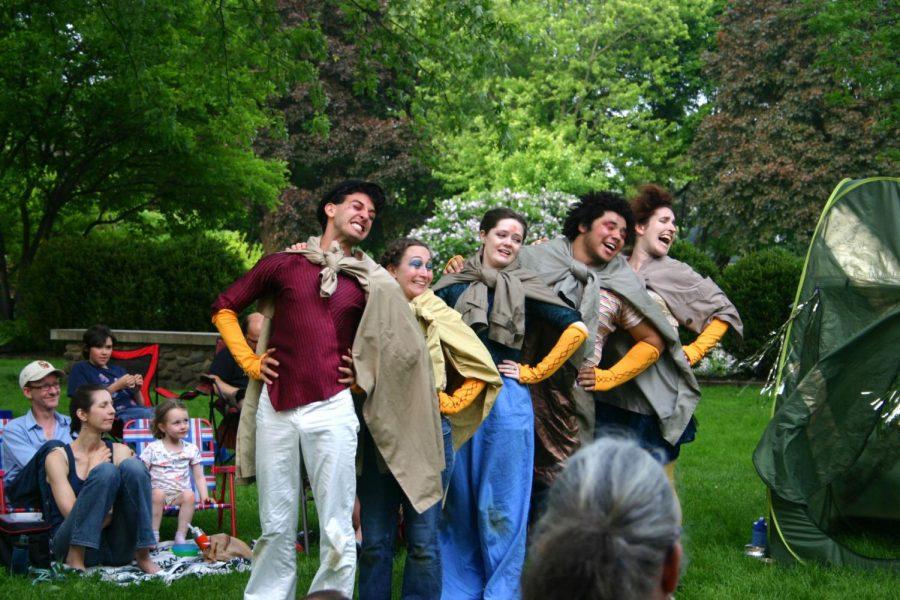Shakespeare gets Bowie makeover at DeKalb’s Huntley Park
June 1, 2019
DeKALB — In one of their stops on their Twelfth Night tour, traveling theatre company Stone Soup Shakespeare performed 6:30 p.m. May 31 in Huntley Park at the corner of 2nd and Garden St. This installment of the show was organized with the help of the DeKalb Public Library, 309 Oak St, in conjunction with the DeKalb Park District.
Here’s Managing Editor Ginger Simons’s take on the performance:
A crowd of patrons saw the music of David Bowie meet Shakespeare’s classic “Twelfth Night” Friday as Stone Soup Shakespeare took to the lawn of Huntley Park. Actress Julia Stemper expressed her gratitude for the weather’s cooperation with their outdoor performance.
“Cross your fingers that nights like tonight continue to happen,” she said, with streaks of red and blue painted on her face in a nod to Bowie’s Ziggy Stardust. “July 9th can monsoon, but until then, please, no rain!”
She’s referring to the dates of the group’s Twelfth Night “FAME” tour, which has shows that continue through the midsummer. Those who have performed outdoors are familiar with the challenges it can pose — rainy days washing out shows, noise from nearby streets and staging a show often without a physical stage — but the audience arrived equipped with lawn chairs and bug spray, and didn’t stop laughing for the full duration of the 90-minute comedy.
With a tent and two clothing racks adorned with costume pieces, a group of six actors brought to life the 10 characters in the play. Using costume pieces to signify changes of character, each actor played multiple roles, and several roles were portrayed by more than one actor through the performance.
“[It was] absolutely amazing,” said DeKalb local and attendee John Paul.
His sister, Joanie Paul, cited audience participation as her favorite aspect of the show, going on to reference a moment wherein her brother and actor John Pennington had a comedic exchange during the show, showcasing the spontaneity of live theatre.
{{tncms-inline alignment=”left” content=”<p>&ldquo;We do this for free. We do this because we think these stories need to be shared, regardless of where people are geographically, economically. They need these stories. We all need these stories.&rdquo;</p>” id=”6a3652e5-4ce8-4dd4-a8c3-abd5d857eb90″ style-type=”quote” title=”Stemper” type=”relcontent” width=”half”}}
“Twelfth Night” centers Viola, a young woman who has been shipwrecked on the island of Illyria, believing her brother Sebastian to be drowned. When she poses as a man and begins working for Duke Orsino, love triangles and mistaken identity ensue, aided by the shenanigans of the Duke’s servants, also a group of musicians.
But, as advertised, this reimagining of Twelfth Night had a contemporary flair — the melodies of Bowie’s classic tunes were integrated into the Shakespearean dialogue, and actors sported makeup resembling and inspired by various eras of Bowie, from Ziggy Stardust to Aladdin Sane.
The androgyny of Bowie’s stage persona was right at home with the themes of gender identity present in the source material. Just as the Bard centered Twelfth Night around a woman posing as a man, the performers were all adorned with makeup and costumes that didn’t fit neatly within traditional gender roles.
Though the language of Shakespeare has a learning curve, the animated performances by the actors aided the audiences’ understanding of the story. Taking advantage of audience interaction and “in the round” staging, where the audience surrounds a central performance space on all sides, Stone Soup Shakespeare made the nearly 400-year-old text engaging and accessible for a modern audience.
“I’ve never seen anything Shakespearean, really,” John said. “But it was modernized, and the humor in it was understandable, so it was really funny. The whole thing was just really enjoyable.”
Stone Soup Shakespeare continues it’s Twelfth Night tour through the Midwest with upcoming performances June 1 in Paris, Illinois and June 2 in Pekin, Illinois. Following the show in an address to the audience, Stemper hinted that Hamlet may be the next Shakespeare classic the group tackles.
“We do this for free,” Stemper said. “We do this because we think these stories need to be shared, regardless of where people are geographically, economically. They need these stories. We all need these stories.”







